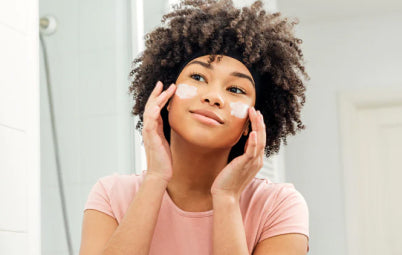If you have sensitive skin, the world of skincare can be a confusing place. With all of the products to try, ingredients to avoid, and routines to follow, it’s hard to know what actually works and what will help sensitive skin. But there are a few simple skincare tips that can make all the difference.
Here at Face Dr, we’ve got decades of experience treating thousands of clients, including those with sensitive skin. Over the years, our team has picked up several tips and tricks that can help when it comes to making sensitive skin look and feel its best, and we’re going to share the best ones here.
Our top tips for sensitive skin are:
- Strengthen the skin’s natural barrier
- Start using a weekly facemask
- Patch test before using new products
- Try a silk pillowcase
- Always check the ingredients
- Exfoliate the right way
Want to take the confusion out of sensitive skin and get an expert opinion? We offer free video consultations where one of our skin experts can make tailored recommendations for products and a skincare routine to suit your exact level of sensitivity.
What is sensitive skin?

Sensitive skin is exactly what it sounds like: skin that’s more sensitive than usual. You may notice a reaction after using certain products — like make-up or skincare — or even your environment, like from hold or cold temperatures. Here’s what to look out for.
The most common symptoms of sensitive skin are:
- Dry skin
- Flaky patches
- Redness
- Itchiness
- Burning or stinging sensation
- Small bumps
Luckily, there is something you can do about sensitive skin. If you’re looking for the perfect routine to follow or our favourite products, you can find those here.
Skincare tips for sensitive skin
1. Strengthen the skin’s natural barrier
Our skin has a natural barrier which works to keep toxins and allergens out and moisture and nutrients in. However, when this becomes damaged, not only can the skin not retain moisture as well, making it dry and dehydrated, but allergens can get in and cause irritation and sensitivity.
Luckily, you can help heal this natural barrier with the right skincare routine. Ingredients like hyaluronic acid, ceramides and glycerin can add moisture to the skin for immediate relief. They can also help heal this natural barrier so that skin becomes less sensitive over time. Look for natural extracts that can provide a dose of antioxidants to protect against free radical damage and further breakdown of the barrier.
Avoid things that can damage the skin in the first place. These include UV rays, hot water — like when showering or washing your face — and overexfoliating or overwashing your skin.
Another way to keep your skin’s natural barrier strong is by using the right skincare routine for you. Need help figuring out what this is? That’s where we can help. With a 30-minute video call, one of our skin experts can recommend the perfect routine to help keep your sensitive skin healthy and strong.
2. Start using a weekly at-home facemask

While it can be easy to want to avoid any unnecessary skincare products when you have sensitive skin, a weekly face mask can be the perfect addition to your routine. Opt for one with hydrating ingredients like hyaluronic acid and glycerin. These can help add moisture to dehydrated skin and reduce any flaky patches and redness. Plus, masks can often be cooling, which is ideal if you experience any stinging or burning sensations from aggravated skin.
Face Dr top pick: ZO Skin Health Complexion Clearing Masque
You could also try:
3. Patch test before using new products
One of the most common triggers of a reaction is using a new product. This can be anything from make-up to skincare to products around the house, like shower gels or laundry detergent. This is why doing a patch test before you start using anything new is so important.
Simply swipe a small amount of the new product somewhere other than your face, like the inside of your wrist. Wait 24 to 48 hours, then check for signs of irritation and redness. If you spot any, don’t use the product. This will save you from damaging your skin and causing a larger reaction. If it’s all clear, you’re less likely to experience a reaction if you start using the product fully.
Skin Expert Tip: If your skin is very sensitive, you can even do a second patch test on a more sensitive area of skin, like on a small patch around your eye, before using the product more.
4. Try a silk pillowcase

You’re spending around eight hours a night with your face pressed against your pillow, so make sure you’re sleeping on the right pillowcase.
You may have heard how great silk pillowcases are for preventing wrinkles and frizzy hair, but they’re actually great for sensitive skin, too. While we sleep, our skin produces excess sweat and oil and pillowcases made of synthetic fibres can hold these against our skin and cause irritation.
Plus, silk pillowcases avoid the artificial dyes and rough fabrics you can often find elsewhere, and they don’t tug and pull on the skin causing damage and aggravation.
Silk pillowcases also don’t soak up your skincare products like other fabrics, too, ensuring all your nourishing ingredients go into your skin where they can help.
Face Dr top pick: John Lewis & Partners The Ultimate Collection Silk Standard Pillowcase £45
5. Always check the ingredients
Just like you might read food labels if you have an allergy, you should always read skincare ingredients to check for common triggers for sensitive skin. Look out for these in particular:
- Alcohol
- Fragrances
- Chemical sunscreens
- Sulphates
- Essential oils
- Salicylic acid
Each of these ingredients can be drying and cause inflammation and damage to sensitive skin.
As well as checking ingredients, be sure to check when your current products go out of date. Throw away any skincare or make-up that’s past its use-by date.
6. Exfoliate the right way

Just because you have sensitive skin, doesn’t mean you have to avoid exfoliating altogether. In fact, you may even find that exfoliating can help to relieve some of the symptoms that often come with sensitive skin, like dry patches and small bumps. However, you can’t just apply any old exfoliator.
For those with skin that’s easily irritated, opt for a weak acid to do the job over stronger acid percentages or harsh physical exfoliators. Look out for exfoliators especially designed for sensitive skin or those with AHAs and especially lactic acid, which is more gentle.
Introduce an exfoliating product slowly by just using a small amount once a week and slowly building up the recommended usage amount so your skin can get used to it.
Face Dr top pick: ZO Skin Health Exfoliating Polish
This is a skin-soothing scrub that uses magnesium crystals to exfoliate gently, without being overly harsh on sensitive skin. Vitamin A, C and E provide antioxidant protection and maintain the skin’s natural barrier. Plus glycerin gives the skin some much-needed hydration. ZO Skin Health is a firm favourite with our clients — and us! — because it’s a brand backed by science and has proven results.
Need expert tips tailored to you?

Those are our top tips for sensitive skin to help you keep irritation under control and start healing damaged skin. The right products, ingredients and skincare routine can make all the difference when it comes to the look and feel of your sensitive skin. But how do you know which ones are right for you? Why not speak with an expert to help.
We only ever recommend products we know and trust ourselves and there’s never any obligation to buy. Beyond these top tips, you can finally find the right products to help take care of your sensitive skin.
Here at Face Dr, we offer free online consultations where you can speak one-on-one with a skin expert. In just 30 minutes, they’ll be able to analyse your skin, ask about your level of sensitivity and recommend the best products to help. They can also recommend products to tackle any other concerns you may have — from hyperpigmentation to acne to ageing.









